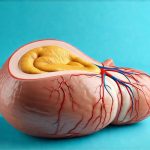Anxiety is a pervasive experience in modern life, affecting millions globally. Often dismissed as simply “stress,” anxiety exists on a spectrum, ranging from mild worry to debilitating panic attacks. While traditionally understood as a psychological phenomenon rooted in thought patterns and external stressors, growing research reveals a surprisingly intimate connection between our mental wellbeing and the health of our digestive system – specifically, our gut. This burgeoning field explores the gut-brain axis, a complex two-way communication network linking the gastrointestinal tract to the brain, suggesting that what happens in your gut can profoundly influence how you feel emotionally, and vice versa. Understanding this link isn’t about finding a ‘cure’ for anxiety solely within digestion; it’s about recognizing the interconnectedness of mind and body and exploring holistic approaches to wellbeing.
For decades, mental health treatment has largely focused on talk therapy and pharmaceutical interventions targeting the brain directly. However, these methods don’t always provide complete or lasting relief for everyone. This is partially because they often address symptoms without necessarily tackling underlying physiological factors that contribute to anxiety. The gut-brain axis offers a new lens through which to examine anxiety, acknowledging the significant role of biological processes and opening up possibilities for innovative, integrative approaches that consider both psychological and physical health. It’s important to note this isn’t about replacing established treatments but potentially enhancing them with lifestyle modifications focused on gut health.
The Gut-Brain Axis: A Two-Way Street
The gut-brain axis isn’t a metaphorical concept; it’s a well-documented physiological system. Communication occurs via multiple pathways, including the vagus nerve, which acts as a direct line between the gut and brain. This nerve carries signals in both directions – from the gut to the brain informing it about digestive status, and from the brain to the gut influencing motility and secretion. Beyond the vagus nerve, other key players include: – The immune system: Gut health significantly impacts immune function, and inflammation in the gut can trigger systemic inflammation that affects the brain. – The endocrine system: The gut produces hormones like serotonin (often called the “happy hormone”), which plays a critical role in mood regulation. – Microbial metabolites: Bacteria in your gut produce compounds that directly impact brain function. These metabolites can be beneficial or detrimental depending on the composition of your microbiome.
This constant back-and-forth isn’t just about physical signals; it’s also about neurochemicals and immune responses. A disrupted gut microbiome – an imbalance of bacteria, fungi, viruses, and other microorganisms residing in your digestive tract – can lead to increased intestinal permeability, often referred to as “leaky gut.” This allows undigested food particles, toxins, and bacteria to enter the bloodstream, triggering inflammation and potentially impacting brain function. Chronic inflammation is a known contributor to anxiety and mood disorders. Conversely, stress and anxiety themselves can negatively impact gut health, creating a vicious cycle. When you’re anxious, your digestive system slows down, altering gut motility and affecting microbial balance. Recognizing this link between anxiety and digestion is key to holistic health.
The complexity of this axis explains why addressing anxiety solely through psychological interventions may not always be sufficient. A healthy gut supports optimal brain function, while a compromised gut can exacerbate anxiety symptoms. It’s about recognizing the interplay between these systems and adopting strategies that support both mental and digestive wellbeing. This isn’t to say everyone with anxiety has a ‘gut problem,’ but it highlights the importance of considering this connection when exploring treatment options.
How Gut Microbiota Influences Anxiety
The microbiome – the collective community of microorganisms in your gut – is incredibly diverse, containing trillions of bacteria, fungi, viruses and other microbes. The composition of this microbiome plays a vital role in overall health, including mental wellbeing. Different strains of bacteria have different effects; some promote positive mood while others may contribute to anxiety. For example, certain bacterial species are known to produce GABA (gamma-aminobutyric acid), a neurotransmitter that has calming and anti-anxiety effects. Others can influence serotonin production, as mentioned earlier, impacting mood regulation directly.
A diverse microbiome is generally considered a healthy one. Diversity means a wider range of beneficial bacteria present, leading to greater resilience and stability in the gut ecosystem. However, modern lifestyles – including diets high in processed foods, antibiotic use, chronic stress, and lack of sleep – can significantly reduce microbial diversity, creating an environment where harmful bacteria thrive. This imbalance, known as dysbiosis, has been linked to a variety of health problems, including anxiety and depression. It’s not always about eliminating ‘bad’ bacteria; it’s often about fostering the growth of beneficial ones. Understanding IBS can help inform your approach to gut health.
Restoring gut health isn’t necessarily a quick fix, but rather a long-term commitment to lifestyle changes that support microbial balance. Strategies include incorporating prebiotic foods (fibers that feed beneficial bacteria), probiotic rich foods (containing live microorganisms), reducing processed food intake, managing stress levels, and getting adequate sleep. It’s crucial to remember that everyone’s microbiome is unique, so what works for one person may not work for another.
The Role of Inflammation in the Gut-Anxiety Connection
Chronic inflammation is increasingly recognized as a key factor in many mental health conditions, including anxiety. As mentioned earlier, gut dysbiosis and increased intestinal permeability can lead to systemic inflammation throughout the body. When the gut barrier is compromised, immune cells are constantly activated by foreign substances entering the bloodstream, triggering an inflammatory response. This chronic activation of the immune system can disrupt brain function, impacting neurotransmitter balance and cognitive processes.
Inflammation affects several key brain areas involved in anxiety processing, such as the amygdala (responsible for fear responses) and the hippocampus (involved in memory and learning). Elevated levels of inflammatory markers have been found in individuals with generalized anxiety disorder and panic disorder. Furthermore, inflammation can interfere with the production of brain-derived neurotrophic factor (BDNF), a protein crucial for neuronal growth, survival, and plasticity. Reduced BDNF levels are associated with increased risk of anxiety and depression.
Addressing gut health is therefore also about addressing inflammation. Dietary changes – such as increasing intake of anti-inflammatory foods like fruits, vegetables, and omega-3 fatty acids – can help reduce inflammation in the gut and throughout the body. Managing stress levels through techniques like mindfulness, yoga, or meditation can also dampen inflammatory responses. Reducing systemic inflammation is a critical step towards supporting both gut health and mental wellbeing. The impact of liver health on reducing inflammation should not be overlooked.
Practical Steps to Support Gut Health for Anxiety Management
While not a substitute for professional mental healthcare, adopting strategies to improve gut health can be a valuable adjunct to anxiety management. Here are some practical steps you can take: – Dietary Changes: Focus on a whole-foods diet rich in fiber, fruits, vegetables, and fermented foods (like yogurt, kefir, sauerkraut). Reduce processed foods, sugar, and artificial sweeteners. Consider identifying food sensitivities that may be contributing to gut inflammation. – Probiotic & Prebiotic Intake: Incorporate probiotic-rich foods into your diet or consider a high-quality probiotic supplement (consult with a healthcare professional before starting any new supplements). Include prebiotic foods like onions, garlic, bananas, and oats to feed beneficial bacteria. – Stress Management: Practice stress-reducing techniques such as mindfulness meditation, deep breathing exercises, yoga, or spending time in nature. Chronic stress negatively impacts gut health. – Adequate Sleep: Aim for 7-9 hours of quality sleep each night. Sleep deprivation disrupts the microbiome and increases inflammation. – Limit Antibiotic Use: Only use antibiotics when absolutely necessary, as they can disrupt the delicate balance of the gut microbiome. Discuss alternatives with your doctor whenever possible.
It’s important to approach these changes gradually and consistently. Small, sustainable lifestyle adjustments are more likely to yield long-term benefits than drastic, unsustainable diets or routines. Pay attention to how different foods and activities affect your body – both physically and emotionally. Keeping a food journal can help identify potential triggers or sensitivities.
Finally, remember that gut health is just one piece of the puzzle when it comes to anxiety management. It’s essential to work with healthcare professionals – including therapists, doctors, and registered dietitians – to develop a comprehensive treatment plan tailored to your individual needs. Recognizing the connection between gut health and anxiety is a significant step towards holistic wellbeing, acknowledging the profound interconnectedness of mind and body. The link between gut health and autoimmune conditions further emphasizes the importance of a healthy microbiome.


















